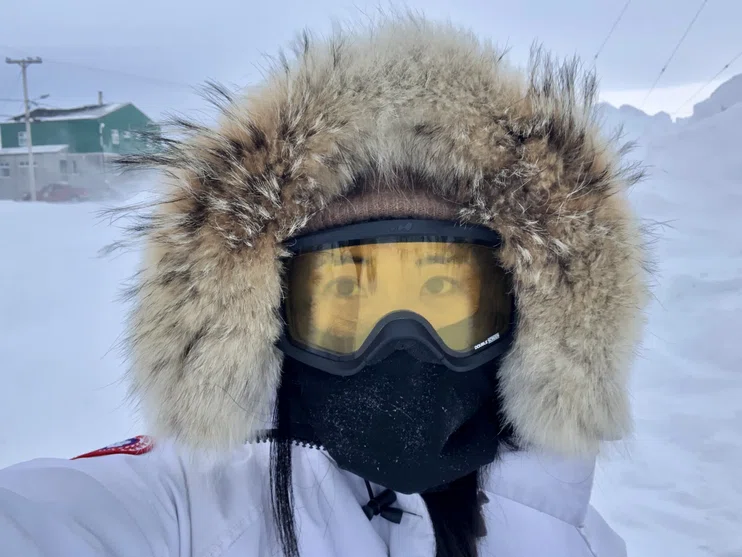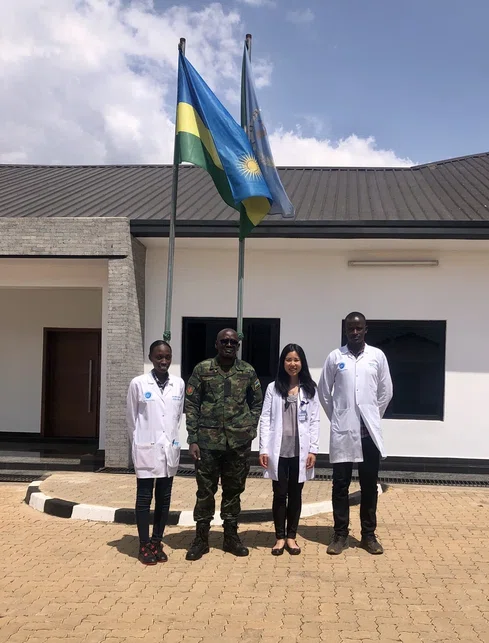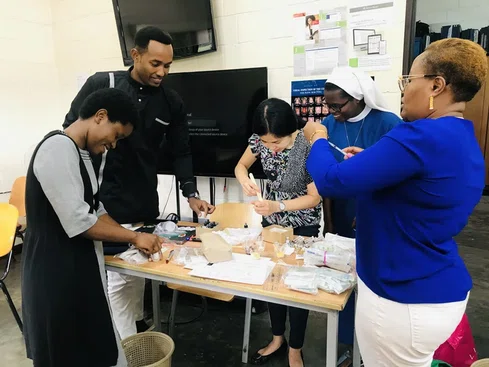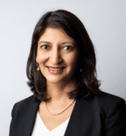


result

Feature Story
Addressing A/I Needs in Developing Nations and Rural Destinations
Addressing A/I Needs in Developing Nations and Rural Destinations
This Fellow-in-Training is Traveling the Globe to Provide Care and Teach Local Healthcare Professionals

What Dr. Kwok wore to go to clinic daily while in Nunavik.
Since beginning high school, Michelle Kwok, MD, a current FIT at McGill University, has traveled around the world to regions where access to quality specialty care can be challenging to obtain, from the icy northern regions of rural Canada to large cities across Africa. “Global health is a passion of mine,” she said. “Not every region of the world is lucky enough to have easy access to medical care. I enjoy helping in any way I can, and along the way I’ve met incredible people and learned so much about how medicine is practiced in different parts of the world.”
Dr. Kwok grew up watching her father, a cardiologist, give back through medical volunteering. Her father would visit China once or twice a year to volunteer. When she was in high school, she began joining him in China to see the work he did and volunteer herself. “It really inspired me not only to volunteer, but to pursue global health as a career,” she said. “I continued to volunteer as my schedule allowed while in university, volunteering in China, Mongolia and Africa. As my interest in the A/I specialty developed, I was able to focus more of my volunteer efforts in that area.”
She used her vacation time as a resident in 2019 to volunteer in Lubango, in Africa, where she worked with CEML Angola primarily at an outpatient internal medicine clinic. She also assisted with outreach efforts to regional hospitals and a children’s center. “I believe every little bit I can do helps,” she said. “When volunteering you need to go in with an open mind and be willing to help with whatever is needed.” During her internal medicine residency in 2021, Dr. Kwok traveled to Chisasibi in northern Quebec for one week to an outpatient clinic. She also provided inpatient consults at Chisasibi Hospital and home visits in the region.

The view outside the clinic where Dr. Kwok worked in Kangirsuk, a village in the Nunavik
region.
In 2023 she traveled to Nunavik, the northernmost region of Quebec. It is one of the Inuit homelands in Canada and the majority of the residents are Inuit. “It’s a large area of land with a small population,” she said. “Medical services are scarce in this remote region. Many residents need to take a plane to one of the two regional hospitals in the north if they require specialized care, and that’s only possible if one of the rotating specialists are visiting at that time to treat patients.”
Specialists in different areas of practice may come up only once a year to care for anyone requiring their area of expertise. Many patients need to be flown all the way to Montreal for procedures, which is expensive and time consuming. While in the Nunavik region, Dr. Kwok traveled to four different villages over three weeks. There were many challenges to working in this region, and even calling her own hospital in the region with a question could be a thirty-minute process. “I had to ask my attendings to get me medical supplies and carry them with me between villages,” she said. “When I did see patients, the medical charts were in French, but most of my patients didn’t speak French. They couldn’t even read their own charts! We need to be cognizant of their needs and provide culturally appropriate care. It’s our job as healthcare professionals.”
Over the course of her time working in the region, Dr. Kwok discovered that allergists, in particular, are needed for this population. “I found that a lot of my patients had dust mite allergies, likely due to the poor housing conditions still here from their colonial past. I also saw food allergy and oral allergy syndrome to very unusual foods, like grapes.” The waiting list to see an allergist when they do visit is long, creating additional barriers to care, and performing certain screenings can be dangerous due to the remote location. “There’s a lot of challenges in this region, and it’s essential that healthcare professionals find ways to connect with these patients,” Dr. Kwok said. “My work there was eye-opening.”
Four days after returning from this northern region, she got on a plane and left for Rwanda, where she spent a month working in a clinic and teaching a short allergy course to medical residents. For the first three weeks she did her rotation with Jean Christophe Kagimbana, MD, in a military hospital. “It’s important to me to see patients where they regularly receive care so I can better understand their needs,” she said. “I want to tailor the care I give to be culturally appropriate. By providing consultations for those three weeks, I was also able to adjust the curriculum of my lectures for medical residents to teach them the skills I felt were most necessary in a way that would resonate with their local patients.”

Dr. Kwok with Dr. Kagimbana, and two local medical students who were rotating in the allergy clinic.
She worked with Ghislaine A. Isabwe, MD, one of the adult allergy attendings at McGill University where Dr. Kwok studies. Dr. Isabwe graduated from University of Rwanda medical school. Together, the pair taught an ‘allergy bootcamp’ course over four days.
They brought supplies for demonstrations including skin prick testing supplies. The program was well-received, though their students did express that a longer course would be helpful. Dr. Kwok would like to continue the course program if she can obtain the funding for it.

Setting up the skin prick test station for the ‘allergy bootcamp course’ in Rwanda.
In the future, she’s hoping to connect with other AAAAI members who are working in global health or interested in volunteer opportunities. “I hope to dedicate my career to global health, allowing me to help underserved populations in developing nations and underserved regions,” she said. “Even by volunteering just once, we can make a big difference in the lives of patients and in communities across the world.”





